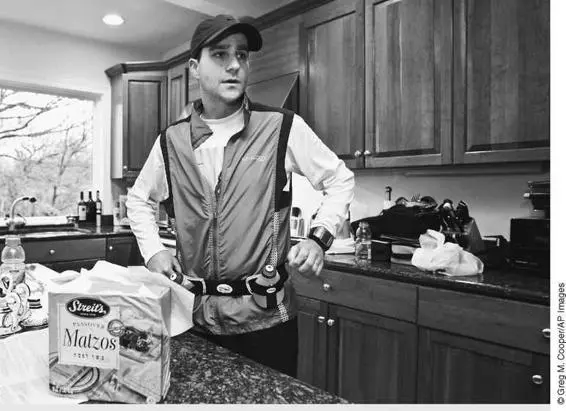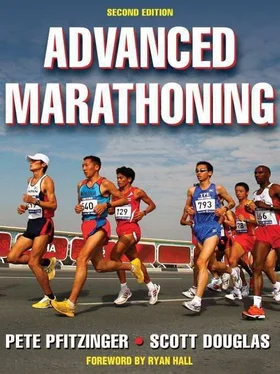Pfitzinger Pete - Advanced Marathoning
Здесь есть возможность читать онлайн «Pfitzinger Pete - Advanced Marathoning» весь текст электронной книги совершенно бесплатно (целиком полную версию без сокращений). В некоторых случаях можно слушать аудио, скачать через торрент в формате fb2 и присутствует краткое содержание. Год выпуска: 2008, Издательство: Human Kinetics - A, Жанр: Спорт, на английском языке. Описание произведения, (предисловие) а так же отзывы посетителей доступны на портале библиотеки ЛибКат.
- Название:Advanced Marathoning
- Автор:
- Издательство:Human Kinetics - A
- Жанр:
- Год:2008
- ISBN:нет данных
- Рейтинг книги:5 / 5. Голосов: 1
-
Избранное:Добавить в избранное
- Отзывы:
-
Ваша оценка:
- 100
- 1
- 2
- 3
- 4
- 5
Advanced Marathoning: краткое содержание, описание и аннотация
Предлагаем к чтению аннотацию, описание, краткое содержание или предисловие (зависит от того, что написал сам автор книги «Advanced Marathoning»). Если вы не нашли необходимую информацию о книге — напишите в комментариях, мы постараемся отыскать её.
Advanced Marathoning — читать онлайн бесплатно полную книгу (весь текст) целиком
Ниже представлен текст книги, разбитый по страницам. Система сохранения места последней прочитанной страницы, позволяет с удобством читать онлайн бесплатно книгу «Advanced Marathoning», без необходимости каждый раз заново искать на чём Вы остановились. Поставьте закладку, и сможете в любой момент перейти на страницу, на которой закончили чтение.
Интервал:
Закладка:
• the amount of blood your heart pumps with each beat decreases, so
• less oxygen-rich blood reaches your working muscles; therefore,
• you produce less energy aerobically, and
• you must run at a slower pace.
These effects are magnified on a hot day because one of your body’s major responses to hot weather is to increase cooling by sending more blood to the skin to remove heat from the body; this process means that even less blood returns to the heart to be pumped to the working muscles. The result is a higher heart rate for a given pace and an inability to maintain the same pace as on a cool day. Looked at in another way, dehydration also reduces your body’s ability to maintain your core temperature because less blood is available to be sent to your skin, and your sweat rate decreases. Struggling to maintain a fast pace on a hot day becomes more dangerous as you become progressively more dehydrated and can lead to heatstroke.
The need to drink during the marathon is obvious. But staying well hydrated is also important during training. Don’t rely just on your thirst – your body’s thirst mechanism is imperfect. Marathoners sometimes become chronically dehydrated without realizing it. Interestingly, this seems to happen most often in the winter, when the need to drink isn’t as obvious. But whenever you’re running high mileage, you need to replace your body’s fluid losses daily, even if you’re training in conditions of -10 degrees Fahrenheit (-23 degrees Celsius). (Fun fact: One reason you can get dehydrated while running even in extremely cold weather is because some bodily fluids are lost when you burn glycogen.)
Dehydration isn’t all bad. When you become dehydrated from exercise, you provide a stimulus for your body to adapt to similar situations in the future by conserving more of what you drink after. The resulting expansion of your blood volume is a positive adaptation. The positive aspects of dehydration are true only up to a point – beyond a moderate amount of dehydration, you sacrifice performance during training, increase your recovery time, and increase your risk of heat-related illness.
That “moderate amount of dehydration” is usually surprisingly small. Studies have found that dehydration of 2 percent of body weight leads to about a 4 to 6 percent reduction in running performance. Ed Coyle, PhD, a former competitive runner and now professor of exercise physiology at the University of Texas at Austin, has provided evidence that even a small amount of dehydration causes a decrease in running performance. This is because any reduction in blood volume will reduce the amount of blood returning to your heart.
During high-mileage runs or runs in hot weather, it’s important to stay hydrated. Carry drinks with you or place drinks in planned positions along your route before you begin the run.

It’s not unusual to lose 3 pounds (1.4 kg) of water per hour when running © on a warm day. At this rate, during a 2-hour run you would lose about 6 pounds (2.7 kg). For a 140-pound (63 kg) runner, this represents more than a 4 percent loss in body weight and an 8 to 12 percent decrement in performance. The effect increases as the run progresses, so this runner wouldn’t be any slower the first few miles but would likely slow by up to a minute per mile by the end of the run. Staying well hydrated, then, can be the difference between training hard enough to provide a strong stimulus for your body to improve or just going through the motions in training.
For any marathoner training in warm conditions, preventing dehydration must be a high priority. How much you need to drink to stay well hydrated during your marathon preparation depends on a number of factors, including the heat and humidity, your body size, how much you’re training, and how much you sweat.
Your baseline fluid needs when you’re not training are about 4 pints (1.9 L) per day. On top of that, you need to add your fluid losses from training and other activities. Weigh yourself before and after running and calculate how much weight you lost, then drink with the objective of bringing your weight back up to normal. Becoming fully hydrated typically requires drinking one and a half times the amount of weight you lost – the extra amount is required because some of what you drink will quickly wind up as urine, necessary to rid your body of waste products. So, for example, if you lost 3 pounds (1.4 kg) during a training run, you would need to drink about 4.5 pounds (2 kg) of fluid (4.5 pints; 2.1 L) during the next several hours to be sure you’re fully rehydrated. (If your postrun beverage contains sodium, you’ll retain more of the fluid you take in.)
If you add 4.5 pints (2.1 L) to make up for the fluid lost during training to the 4 pints (1.9 L) you require as a baseline, that makes a total fluid requirement of 8.5 pints (4 L) for the day in this example. This is a large amount of fluid, and consuming this much during the day requires a strategy, particularly for those with normal jobs. Keeping a water bottle at your workstation is a must. You’ll regain fluids most effectively if you discipline yourself to drink regularly throughout the day. Try to avoid waiting until shortly before training to replace your fluids – you can’t rush the process, and so you’ll go into your workout either bloated from too much fluid ingested too quickly or dehydrated from not having enough fluid.
Interestingly, although it’s important to drink throughout the day, recent research has found that drinking more fluid less frequently, compared with drinking the same total volume spread out in smaller, more frequent intakes, speeds gastric emptying (from your stomach to your intestines). That is, drinking, say, a pint of water all at once at the beginning of the hour should result in greater gastric emptying than drinking that same pint divided among 4-ounce servings every 15 minutes. The key is not to overload your system, because that will slow gastric emptying. If you feel bloated and have intestinal distress after drinking a large amount of fluid at once, you’ve probably exceeded what your system can tolerate at once.
How much you should drink during your race is discussed under “Marathon Race-Day Nutrition and Hydration” later in this chapter.
Water and carbohydrate-replacement drinks that contain sodium are excellent for maintaining hydration during running. The advantage of replacement drinks with 4 to 8 percent carbohydrate is that they’re absorbed as quickly as water and also provide readily usable energy. The carbohydrate can help your performance during workouts lasting longer than 1 hour. The exact carbohydrate concentration that’s best for you will depend on your stomach’s tolerance and how warm it is during training and during your marathon. On a cool day, you may want to use a carbohydrate content of 6 to 8 percent, whereas on a warm day, when fluid is more critical than extra carbohydrate, you may want to stay in the 4 to 6 percent range. Sports drinks should also contain between 250 and 700 mg of sodium per liter to enhance glucose and water absorption and improve fluid retention.
Most running books just tell you to avoid alcohol and caffeine. That’s neither realistic nor helpful advice for the majority of people who regularly enjoy coffee, tea, beer, wine, or spirits. The real issue is determining how much of these beverages you can drink before they have a significant effect on your running performance.
Читать дальшеИнтервал:
Закладка:
Похожие книги на «Advanced Marathoning»
Представляем Вашему вниманию похожие книги на «Advanced Marathoning» списком для выбора. Мы отобрали схожую по названию и смыслу литературу в надежде предоставить читателям больше вариантов отыскать новые, интересные, ещё непрочитанные произведения.
Обсуждение, отзывы о книге «Advanced Marathoning» и просто собственные мнения читателей. Оставьте ваши комментарии, напишите, что Вы думаете о произведении, его смысле или главных героях. Укажите что конкретно понравилось, а что нет, и почему Вы так считаете.










